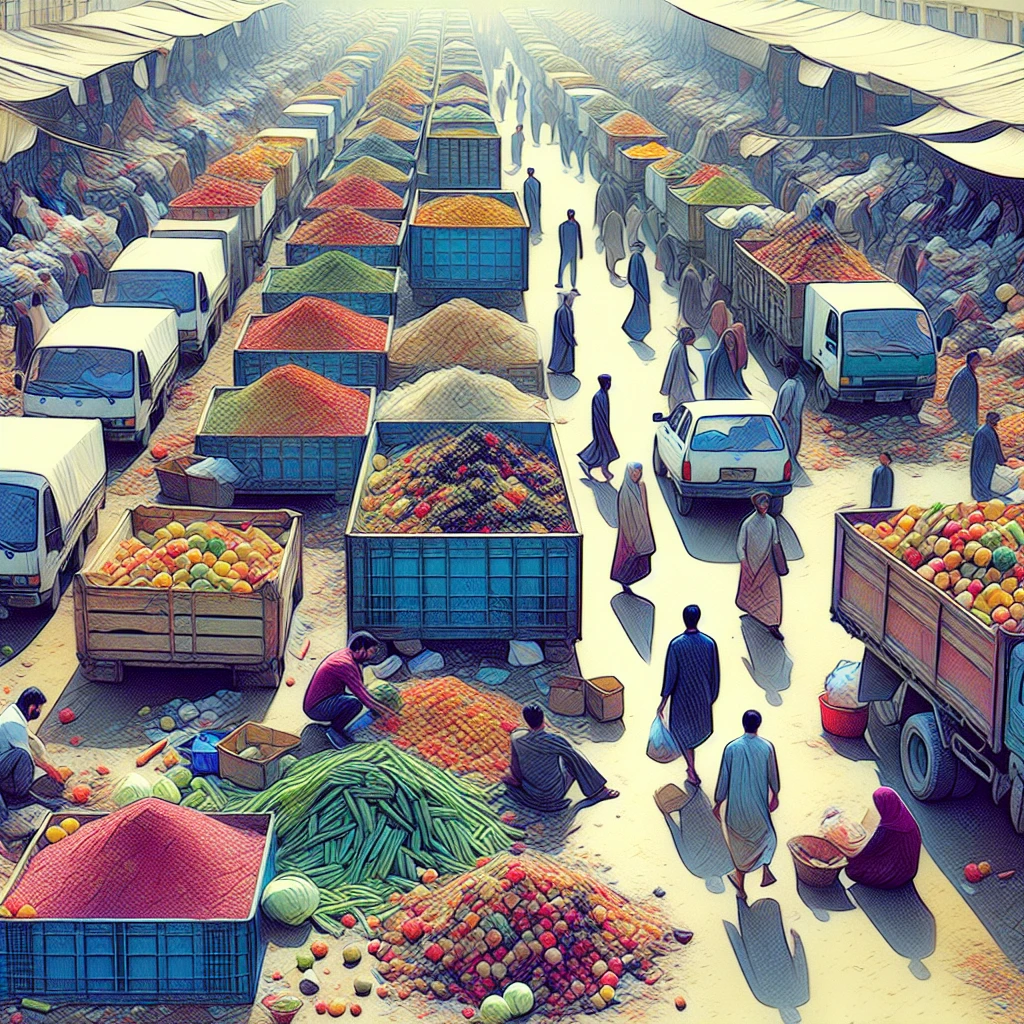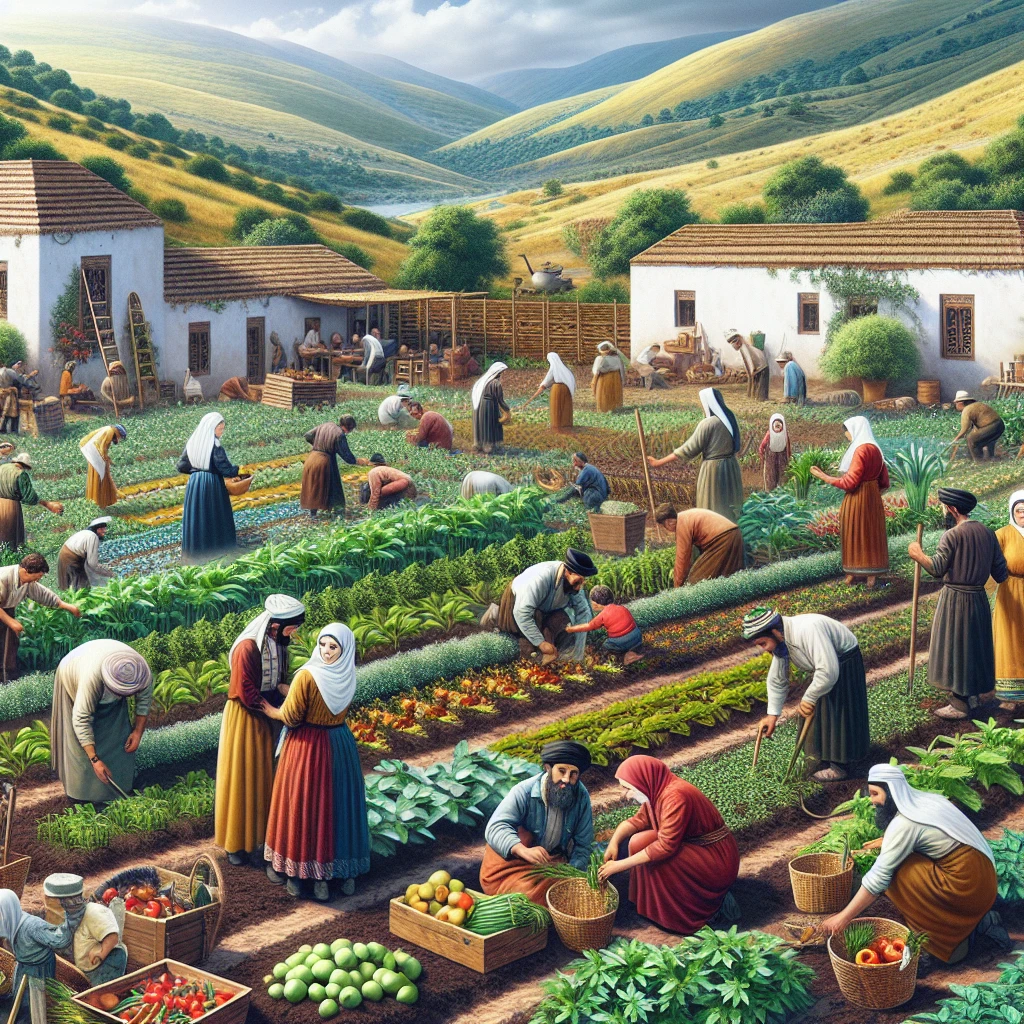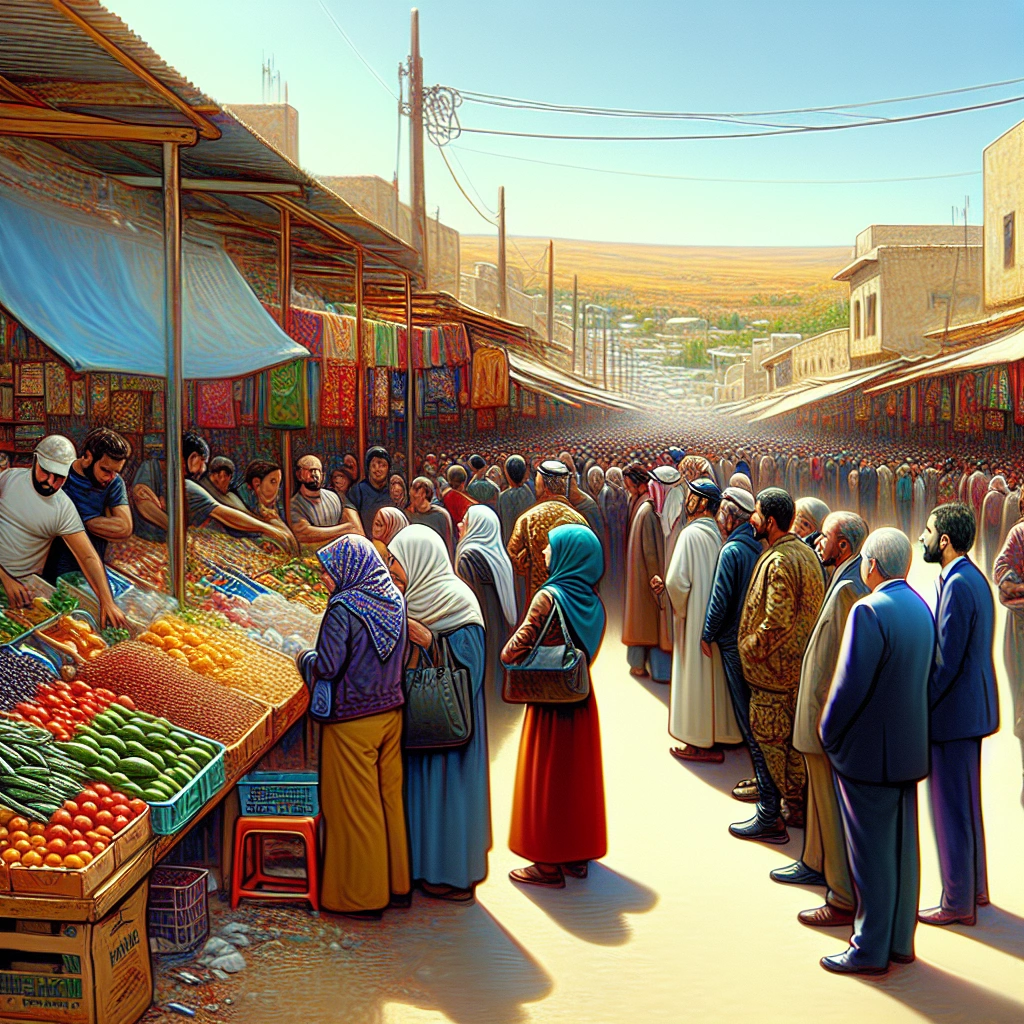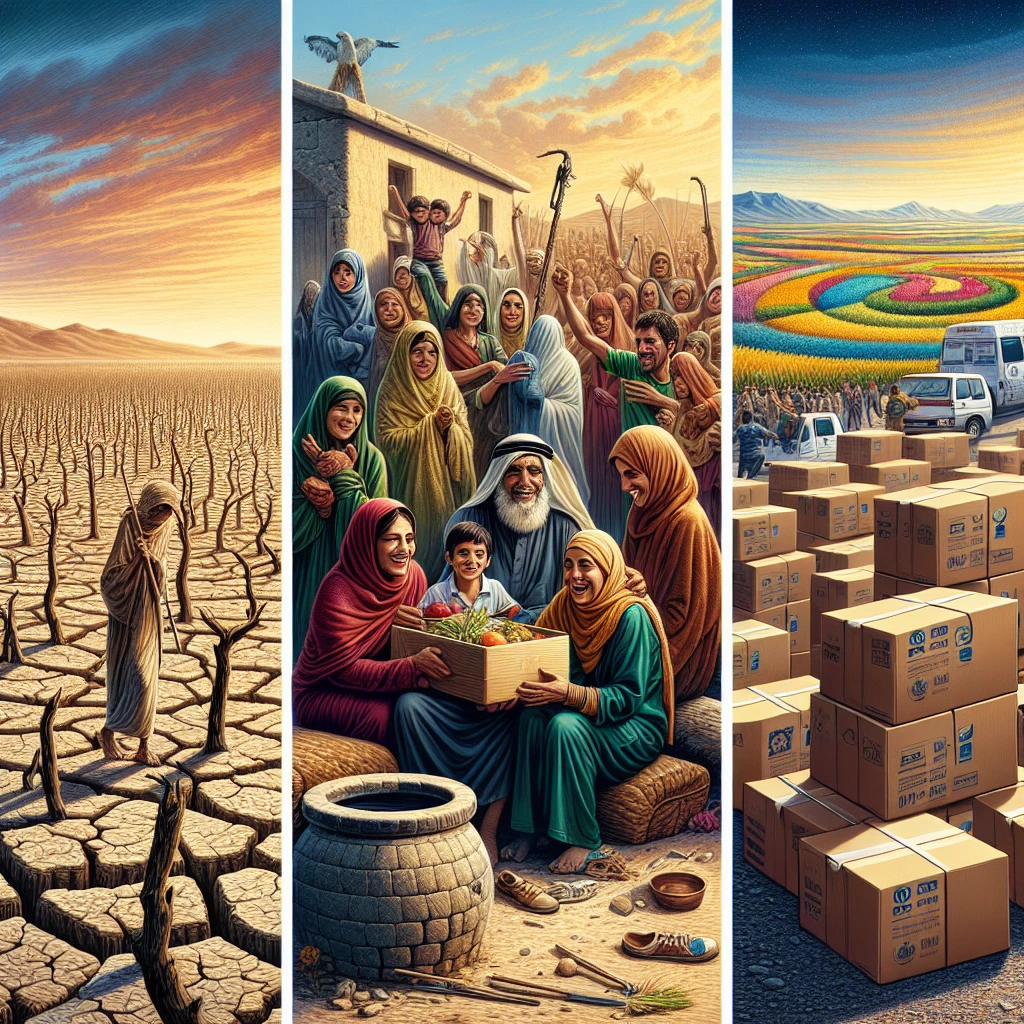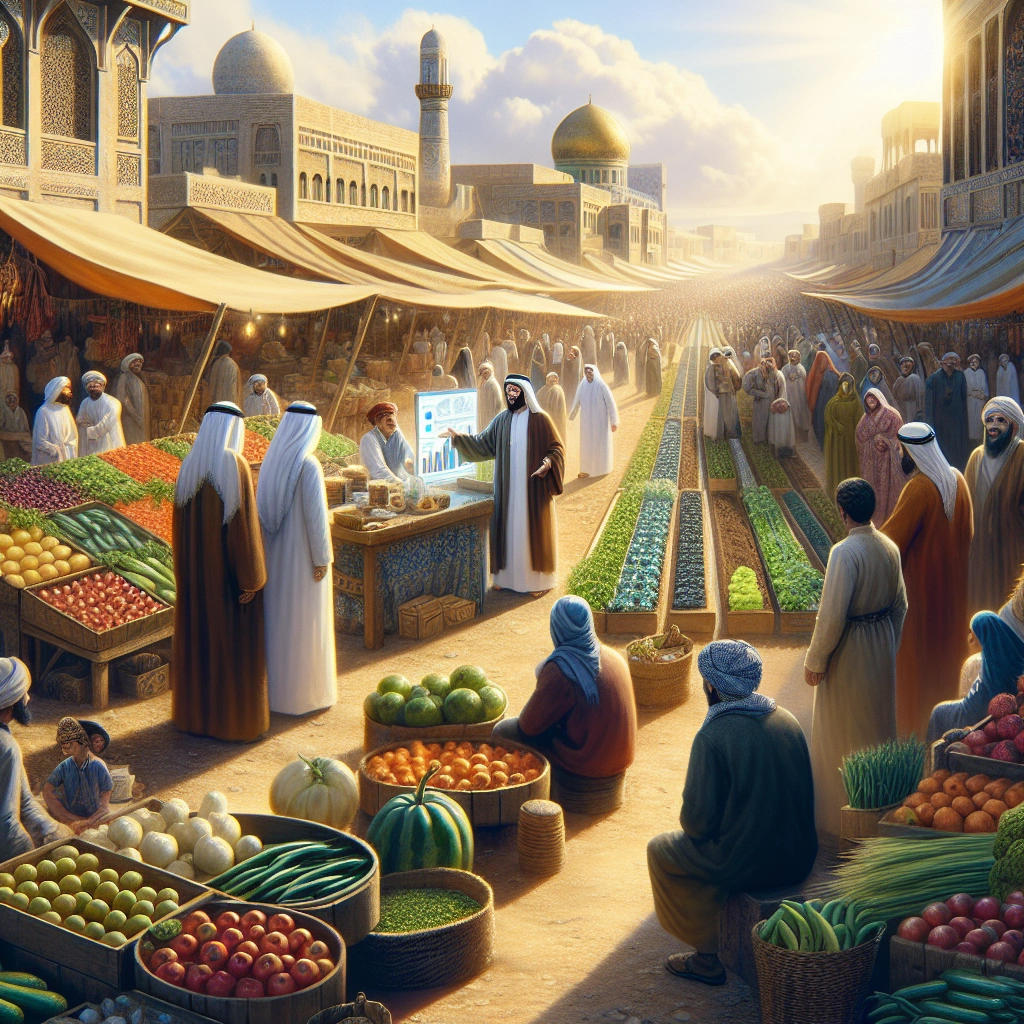

Food shortage crisis in Middle Eastern countries is a growing challenge, exacerbated by conflicts, political instability, and heavy reliance on imports. Understanding the causes of food shortages in the region is crucial to addressing the issue and finding sustainable solutions.
The impact of food shortages on the population includes increased levels of hunger and malnutrition, posing a threat to the region’s development and stability.
Check out this Youtube video: “The End of Famine (35 min) – YouTube” to gain insights into the causes of food shortages in middle eastern countries and how we can put an end to famine.
Socio-Economic Factors
Impact of poverty on access to food
Poverty significantly impacts access to food in middle eastern countries, leading to widespread food insecurity. Many families living below the poverty line struggle to afford nutritious meals, resulting in malnutrition and hunger.
This affects children the most, leading to long-term health issues and developmental setbacks. For example, in Yemen, where poverty rates are high, over 20 million people are food insecure, exacerbating the already dire humanitarian crisis in the region.
Unemployment and its effect on food security in the region
Unemployment directly correlates to food insecurity, as the lack of employment opportunities hinders individuals’ ability to provide for their families. With limited income, families are unable to afford essential food items, leading to widespread hunger and malnutrition.
For instance, in Syria, the prolonged conflict has led to a significant rise in unemployment, exacerbating food shortages and creating a dire situation for many families struggling to meet their basic needs.
Income inequality contributing to food shortages
Income inequality plays a pivotal role in perpetuating food shortages in middle eastern countries. The significant wealth gap results in limited access to resources and opportunities for certain segments of the population, leading to unequal access to food.
For instance, in countries like Lebanon, the disparity in income distribution has led to pockets of extreme poverty, creating significant challenges in ensuring food security for all citizens.
| Country | Poverty Rate | Unemployment Rate | Food Insecurity |
|---|---|---|---|
| Yemen | 55% | 45% | Severe |
| Syria | 35% | 40% | Critical |
| Lebanon | 25% | 30% | High |
Political Instability
Conflict and its role in disrupting food supply chains
Conflict in the Middle East has significantly disrupted food supply chains, leading to shortages and increased prices. Ongoing wars and territorial disputes have hampered agricultural production and distribution, making it challenging to transport food to areas in need.
For example, the conflict in Yemen has severely disrupted the import and distribution of food, leading to acute food insecurity and malnutrition among millions of people.
Government corruption and mismanagement of resources
Government corruption and mismanagement of resources have exacerbated food shortages in middle eastern countries. Corrupt practices, such as bribery and embezzlement, divert essential resources away from the agricultural sector, hindering agricultural development and food production.
For instance, reports of land corruption and bribery in exchange for land access have resulted in disrupted farming activities, ultimately impacting food security for local communities.
Impact of sanctions and embargoes on food imports
The impact of sanctions and embargoes on food imports is a critical factor contributing to food shortages in middle eastern countries. Economic sanctions imposed on certain nations can limit or halt food imports, leading to a scarcity of essential food items.
For example, the EU’s sanctions on Russia, particularly in the energy sector, have influenced global supply chains, affecting food trade and prices. Sanctions and embargoes restrict trade and financial activities, impacting the availability and affordability of food in the region.
| Conflict | Government Corruption | Sanctions |
|---|---|---|
| Ongoing wars disrupt food supply chains | Corruption diverts resources from agriculture | Sanctions limit food imports |
| Yemen conflict leads to acute food insecurity | Land corruption hampers farming activities | EU sanctions affect global supply chains |
| Territorial disputes hinder food distribution | Bribery impacts agricultural development | Impact on food trade and prices |
The complexities of political instability, corruption, and trade sanctions significantly contribute to the food shortages experienced in middle eastern countries, necessitating global attention and innovative solutions to address these pressing challenges.
Environmental Challenges
Droughts and water scarcity affecting agricultural production
Droughts and water scarcity in middle eastern countries have a significant impact on agricultural production. The lack of water leads to decreased crop yields and a shortage of food supply.
For example, in 2017, the USDA reported a notable decrease in corn crop production due to drought, highlighting the real and immediate effects of water scarcity on agriculture.
Desertification and its impact on arable land
Desertification poses a severe threat to arable land in middle eastern countries. Human-caused land degradation, coupled with low or variable rainfall, contributes to the depletion of fertile soil, making it unsuitable for crop cultivation.
This process results in reduced agricultural productivity and ultimately leads to food shortages in the region.
Climate change and its influence on food security
Climate change significantly influences food security in middle eastern countries. Rising temperatures, erratic precipitation patterns, and extreme weather events such as heatwaves and droughts disrupt agricultural activities, leading to diminished food availability and increased prices.
Thus, climate change presents a formidable challenge to achieving sustainable food security in the region.
Agricultural Practices
Traditional farming methods and their limitations
Traditional farming methods in Middle Eastern countries often involve practices such as agroforestry, intercropping, and shifting cultivation. While these methods have been used for generations and are well-adapted to local conditions, they have limitations that contribute to food shortages.
For example, traditional farming often relies heavily on water and can lead to water scarcity, especially during dry periods. Additionally, these methods may not be scalable or efficient enough to meet the increasing demand for food in the region.
Lack of investment in modern agricultural technologies
The lack of investment in modern agricultural technologies is a significant factor contributing to food shortages in Middle Eastern countries. While advanced farming technologies offer greater efficiencies, lower prices, and safer growing conditions, the adoption of these technologies has been limited in the region.
This lack of investment hinders the development of more sustainable and productive agricultural practices, ultimately impacting food production and availability.
Water usage and irrigation challenges in food production
Water usage and irrigation challenges play a critical role in contributing to food shortages in Middle Eastern countries. The region faces water scarcity, and many traditional irrigation systems are inefficient, leading to the overuse of water in agriculture.
This not only strains water resources but also impacts crop yields. Furthermore, water challenges are expected to strongly impact agriculture, which remains the largest user of water globally.
Addressing these challenges is crucial for ensuring sustainable food production in the region.
Global Market Dynamics
Impact of international trade policies on food availability
The impact of international trade policies on food availability is substantial. Trade policies can either enhance or restrict access to food supplies in Middle Eastern countries.
For instance, tariffs and trade barriers can limit the import of essential food items, leading to shortages. On the other hand, trade agreements that facilitate seamless importation can improve food availability.
An example would be the impact of free trade agreements on the availability of fresh produce and other dietary staples.
Dependence on food imports and its vulnerability to market fluctuations
Middle Eastern countries heavily depend on food imports to meet the dietary needs of their populations. However, this dependence makes them vulnerable to market fluctuations.
Any disruptions in the global supply chain, such as natural disasters or economic crises, can lead to severe food shortages in these countries. For instance, a sudden spike in global food prices can significantly impact the ability of these nations to import an adequate quantity of food, leading to scarcity.
Role of multinational corporations in shaping food distribution
Multinational corporations play a pivotal role in shaping food distribution across the Middle East. Their influence extends from production to retail, affecting the availability of various food products.
For example, multinational corporations have the power to influence the availability of processed and packaged foods compared to locally sourced fresh produce. Furthermore, their distribution networks and market dominance can sway the accessibility of certain food items within the region.
| Factor | Impact on Middle Eastern Countries |
|---|---|
| International Trade Policies | Can enhance or restrict food imports |
| Dependence on Food Imports | Vulnerability to market fluctuations |
| Role of Multinational Corporations | Influence food distribution networks |
By considering these factors, it becomes evident that the global market dynamics significantly affect food availability in Middle Eastern countries. The interplay between international trade policies, dependence on imports, and the involvement of multinational corporations shapes the food landscape in these nations.
War and Conflict
Direct impact of war on food production and distribution
War directly impacts food production and distribution by causing the destruction of agricultural land, crops, and infrastructure used for food production. Warring parties may plunder food supplies and deliberately destroy civilian infrastructure, leading to severe disruptions in economic activities and threatening the means of survival for entire populations.
The methods used in warfare, such as landmines and bombings, result in the destruction of vital food sources and hinder the transportation and distribution of food, exacerbating food shortages in conflict zones.
Displacement of populations leading to food insecurity
The displacement of populations due to war plays a critical role in exacerbating food insecurity in conflict zones. Wars commonly trigger the mass displacement of people, cutting them off from their food supplies and livelihoods.
As a result, displaced populations are among the most vulnerable to food insecurity and malnutrition, further exacerbating the existing food shortages. Additionally, the displacement of communities can lead to the abandonment of agricultural lands, creating a lack of food production in these areas and contributing to the overall food scarcity.
Humanitarian aid and its role in addressing food shortages in conflict zones
In conflict zones, humanitarian aid plays a vital role in addressing food shortages by providing short-term food assistance to conflict-affected people and communities. Humanitarian relief operations aim to prevent or alleviate human suffering induced by disasters and conflicts, focusing on improving food consumption in these areas.
However, the genuine role of international relief operations in food crises goes beyond short-term assistance, as they also play a crucial role in preventing and responding to food insecurity, particularly in situations where parties to the conflict are unable to do so. Therefore, humanitarian aid serves as a crucial lifeline for addressing food shortages in conflict-affected regions, providing essential support to vulnerable populations during times of war and ongoing crises.
| War and Conflict | Impact on Food Production and Distribution |
|---|---|
| Destruction of agricultural land and crops | Critical infrastructure disruption |
| Plundering of food supplies | Transportation hindrances |
The table above summarizes the direct impact of war on food production and distribution, highlighting the destructive consequences of warfare on food security in conflict zones.
Food Waste and Loss
Inefficiencies in food distribution and storage
Food waste and loss due to inefficiencies in food distribution and storage are a critical issue, leading to significant shortages. Poor logistics, lack of technology, and inadequate infrastructure contribute to substantial losses before the food reaches the consumers.
For instance, modern grain storage and distribution efficiency are hampered, leading to a drastic increase in food losses even before it reaches the market.
Lack of infrastructure for food preservation
The absence of proper infrastructure for food preservation amplifies the problem of food shortages in the Middle Eastern countries. Limited access to adequate cold storage facilities and controlled atmosphere storage results in substantial wastage of fresh produce, ultimately contributing to food shortages.
Cultural attitudes towards food consumption contributing to waste
Cultural attitudes play a significant role in exacerbating food waste. The perception of abundance within many cultures fosters over-purchasing and over-preparation of food, leading to substantial wastage.
In some cultures, the idea of an unlimited supply of food leads to careless consumption and disposal practices, contributing to the scarcity of food resources.
| Inefficiencies in food distribution and storage | Lack of infrastructure for food preservation | Cultural attitudes towards food consumption contributing to waste |
|---|---|---|
| Poor logistics and infrastructure contribute to substantial losses | Limited access to cold storage facilities and controlled atmosphere storage | Perception of abundance leads to over-purchasing and over-preparation |
Tackling these issues will require a comprehensive approach involving technological advancements, infrastructure development, and a shift in cultural attitudes toward food consumption and waste.
Health and Nutrition
Rise in malnutrition and its connection to food shortages
The rise in malnutrition in middle eastern countries is intricately linked to food shortages. Limited access to nutritious food due to factors such as poverty and unemployment has led to an increase in malnutrition among the population.
This lack of access to essential nutrients has resulted in a higher prevalence of malnutrition, impacting the overall health and well-being of individuals.
Impacts of food insecurity on public health
Food insecurity has had significant impacts on the public health of middle eastern countries. The lack of access to affordable and nutritious food has led to a higher risk of chronic health conditions such as diabetes, obesity, heart disease, and mental health disorders.
This has subsequently resulted in an increased burden on the healthcare system and has contributed to overall health disparities within the population.
Access to healthcare and its relationship to food availability
Access to healthcare is closely intertwined with food availability in middle eastern countries. Individuals facing food insecurity often struggle to access adequate healthcare due to financial constraints and other socioeconomic factors.
This lack of access to healthcare further exacerbates the detrimental effects of food shortages on public health, creating a challenging cycle that requires comprehensive interventions to address both food security and healthcare accessibility.
| Food Insecurity Impacts | Public Health |
|---|---|
| Higher prevalence of malnutrition | Increased risk of chronic health conditions |
| Limited access to essential nutrients | Burden on healthcare system |
| Contributing to overall health disparities | Financial constraints on healthcare access |
The table above highlights the significant impacts of food insecurity on public health, emphasizing the urgent need for holistic solutions to address the complex relationship between food availability, nutrition, and healthcare.
Technological and Innovation Solutions
Role of technology in improving agricultural productivity
Technology plays a pivotal role in revolutionizing agricultural productivity. Advanced technologies such as precision agriculture, smart irrigation, and biotechnology enable farmers to optimize resource utilization, enhance crop yield, and minimize environmental impact.
For instance, precision agriculture leverages data from satellite imagery and sensors to monitor and manage field conditions, resulting in targeted and efficient use of resources. Additionally, biotechnology facilitates the development of genetically modified crops with enhanced resilience to adverse conditions, ensuring consistent productivity despite environmental challenges.
Innovative solutions to mitigate the impact of environmental challenges
Innovative agricultural solutions are indispensable in mitigating the impact of environmental challenges on food production. Technologies like hydroponics and aeroponics enable efficient cultivation of crops with minimal water usage, addressing water scarcity concerns.
Furthermore, digital platforms and data-driven insights empower farmers to make informed decisions regarding sustainable farming practices, thereby mitigating the environmental impact of agricultural activities. These innovations not only enhance productivity but also contribute to environmental sustainability by reducing resource consumption and minimizing ecological footprint.
Digital platforms to enhance food distribution and access
In the domain of food distribution and access, digital platforms play a crucial role in optimizing supply chain efficiency and ensuring widespread access to essential food resources. Through advanced data analytics and artificial intelligence, digital platforms facilitate predictive forecasting of demand, enabling proactive management of food distribution networks.
Moreover, technologies such as blockchain ensure transparency and traceability in the food supply chain, fostering consumer trust and promoting fair access to high-quality food products. By leveraging digital solutions, stakeholders can address food shortages in middle eastern countries through streamlined and equitable food distribution, ultimately enhancing access to nutritional resources.
| Agriculture Technology | Advantages |
|---|---|
| Precision agriculture | Optimizes resource utilization, enhances crop yield |
| Smart irrigation | Minimizes water usage, addresses water scarcity |
| Biotechnology | Develops resilient crops, ensures consistent productivity |
| Hydroponics & aeroponics | Efficient cultivation, minimal water usage |
| Digital platforms | Predictive forecasting, transparent supply chain |
Technological advancements and innovative solutions are pivotal in addressing the root causes of food shortages in middle eastern countries. Embracing these technologies not only enhances agricultural productivity but also contributes to environmental sustainability and equitable food distribution, fostering a brighter future for food security in the region.
Community Empowerment
Local initiatives to address food shortages
To address food shortages in middle eastern countries, local initiatives play a crucial role in providing immediate relief and long-term solutions. Local communities can establish community gardens, food cooperatives, and communal kitchens to ensure everyone has access to nutritious food.
Additionally, organizing food drives and partnering with local businesses and farmers can help bridge the gaps in food supply.
Importance of community engagement in addressing food insecurity
Community engagement is vital in addressing food insecurity as it fosters a sense of unity and shared responsibility. By involving community members in decision-making processes, such as developing sustainable food programs and advocating for policy changes, a more inclusive approach can be established.
Empowering individuals to participate actively in finding solutions builds resilience and strengthens community bonds.
Role of education and awareness in promoting sustainable food practices
Education and awareness are paramount in promoting sustainable food practices. Implementing programs that educate the community about efficient farming techniques, proper food storage, and waste reduction can lead to more sustainable food production and consumption.
By raising awareness about the environmental impact of food choices, communities can actively contribute to a more sustainable and resilient food system.
International Aid and Support
Role of international organizations in addressing food shortages
International organizations play a critical role in addressing food shortages in middle eastern countries. The Food and Agricultural Organization (FAO) and the World Food Programme (WFP) are at the forefront of providing essential support and resources to combat food insecurity in the region.
These organizations work collaboratively with governments and local communities to implement sustainable solutions, alleviate hunger, and promote food security.
Humanitarian aid efforts and their impact on food security
Humanitarian aid efforts have a profound impact on enhancing food security in the middle eastern countries. Through rapid and adequate support, organizations such as the World Food Programme and other humanitarian bodies contribute significantly to mitigating food crises and averting human suffering.
By providing food assistance, cash transfers, and distributing agricultural inputs, these efforts have been instrumental in addressing immediate food needs and fostering resilience against food insecurity in the region.
Collaborative approaches to addressing food shortages in the region
Collaborative approaches are essential for addressing food shortages in the middle eastern countries. Through partnerships with local stakeholders, researchers, and humanitarian organizations, collaborative strategies enable the development of effective solutions to improve nutrition security and access to high-quality food.
Furthermore, participation in participatory research and innovative programs, such as Meals-to-You, highlights the critical role of collaboration in addressing food insecurity and creating sustainable impact in the region.
Public Policy and Governance
Importance of effective policies in addressing food shortages
Effective policies play a vital role in addressing food shortages in middle eastern countries. By implementing policies that focus on sustainable agriculture, food distribution, and trade agreements, governments can ensure a stable and reliable food supply for their citizens.
Additionally, policies aimed at reducing food waste and promoting efficient resource management can contribute to alleviating food shortages in the region.
Role of governance in promoting food sovereignty
The governance of middle eastern countries plays a crucial role in promoting food sovereignty. Through responsible and transparent governance, these nations can prioritize domestic food production, support local farmers, and invest in agricultural infrastructure.
By actively participating in international trade negotiations, governments can also ensure access to essential food resources, further enhancing food sovereignty within their borders.
Inclusive decision-making processes to address food insecurity
Inclusive decision-making processes are essential to effectively address food insecurity in middle eastern countries. By engaging diverse stakeholders, including farmers, food producers, and community leaders, governments can develop policies that truly reflect the needs of their populations.
Additionally, encouraging collaboration with non-governmental organizations and international agencies can lead to holistic strategies that address complex challenges associated with food insecurity.
| Category | Importance |
|---|---|
| Sustainable Agriculture | Ensures long-term food security |
| Food Distribution | Equitable access for all citizens |
| Trade Agreements | Enhances food availability |
Your response is quite important! This way, people can have a clear picture that the importance of effective policies in addressing food shortages, the role of governance in promoting food sovereignty, and the need for inclusive decision-making processes are crucial elements in tackling food insecurity in middle eastern countries.
Recommended Amazon Products for Addressing Food Shortages in Middle Eastern Countries
Here’s a curated list of products that can help address the food shortages in Middle Eastern countries. These recommendations are based on practicality, affordability, and positive customer reviews.
Miracle-Gro Water Soluble All Purpose Plant Food
This plant food is recommended for improving agricultural productivity in the face of water scarcity and desertification. The Miracle-Gro Water Soluble All Purpose Plant Food provides essential nutrients for plants to thrive even in challenging environmental conditions. You can find the Miracle-Gro Water Soluble All Purpose Plant Food on Amazon by clicking here.


Pros:
| Pros |
|---|
| Boosts plant growth |
| Facilitates nutrient uptake |
| Easy to use |
Cons:
| Cons |
|---|
| May require frequent application |
| Soluble formula may make it prone to leaching |
| May not be suitable for all plant species |
Hydro Flask Water Bottle
With droughts and water scarcity affecting agricultural production, it’s essential for farmers and workers to stay hydrated. The Hydro Flask Water Bottle is a high-quality, durable option designed to keep drinks cold for hours, perfect for those working in hot and dry conditions. Find the Hydro Flask Water Bottle on Amazon here.


Pros:
| Pros |
|---|
| Excellent insulation |
| Durable construction |
| Wide range of color options |
Cons:
| Cons |
|---|
| Higher price point |
| Heavier than some alternatives |
| Some users find the lid challenging to clean |
LED Grow Light
In regions where natural sunlight may be insufficient for agricultural production, LED grow lights can play a crucial role. The full-spectrum LED Grow Light is recommended for its energy efficiency and ability to promote plant growth indoors. Find the LED Grow Light on Amazon here.


Pros:
| Pros |
|---|
| Energy-efficient |
| Promotes healthy plant growth |
| Adjustable settings for different plant species |
Cons:
| Cons |
|---|
| Initial investment can be high |
| Requires access to electricity |
| May have specific installation requirements |
Beekeeping Starter Kit
Promoting modern agricultural practices, such as beekeeping, is essential for sustainable food production. The Beekeeping Starter Kit is recommended for its comprehensive set of tools and protective gear, ideal for individuals interested in beekeeping as a means to support pollination and enhance agricultural productivity. Find the Beekeeping Starter Kit on Amazon here.


Pros:
| Pros |
|---|
| Complete starter set |
| Protective gear included |
| Suitable for beginners |
Cons:
| Cons |
|---|
| Requires ongoing time and effort |
| Initial learning curve for beginners |
| Maintenance of beehive required |
Micro-Irrigation System
In regions facing water usage and irrigation challenges in food production, a Micro-Irrigation System can optimize water distribution. This system is designed for efficiency, delivering water to the roots of plants, reducing waste, and promoting a healthier crop. Find the Micro-Irrigation System on Amazon here.


Pros:
| Pros |
|---|
| Water-efficient |
| Customizable for different crop needs |
| Reduces water waste |
Cons:
| Cons |
|---|
| Initial setup required |
| Requires maintenance |
| Limited to specific land sizes |
Top Recommended Product for Addressing Food Shortages in Middle Eastern Countries
If you’re looking for the best solution to address food shortages in Middle Eastern countries, we highly recommend the Miracle-Gro Water Soluble All Purpose Plant Food. This product provides essential nutrients to support plant growth in challenging environmental conditions. Ready to improve agricultural productivity? Check out the Miracle-Gro Water Soluble All Purpose Plant Food today for the best results!


Conclusion
The main causes of food shortages in Middle Eastern countries include political instability, conflict, and war, which disrupt agricultural production and distribution. Economic challenges such as poverty and unemployment also contribute to food insecurity in the region.
Furthermore, it is crucial to address the crisis through multi-faceted approaches, including humanitarian aid, investment in sustainable agriculture, and promoting peaceful resolution of conflicts. These efforts can help ensure food availability and access for vulnerable populations in the Middle East.
Addressing the root causes of food shortages is essential for achieving sustainable solutions in the region. By addressing underlying issues such as political instability, conflict, and poverty, we can work towards creating a more secure and stable food supply in Middle Eastern countries.






